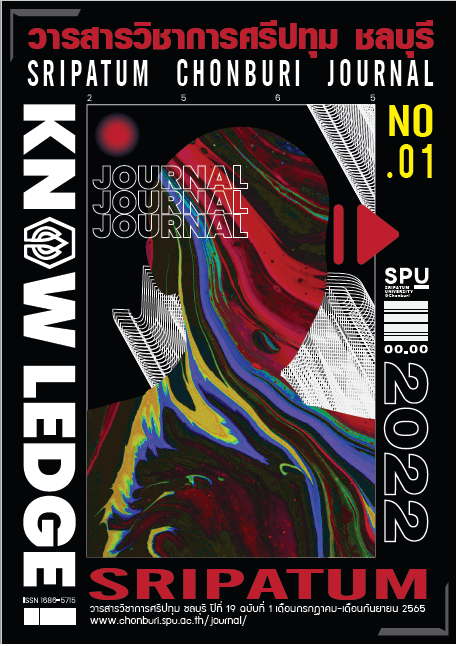การพัฒนารูปแบบการจัดการเรียนรู้แบบ STEM Education สำหรับครูปฐมวัยในจังหวัดร้อยเอ็ด
คำสำคัญ:
การพัฒนาการจัดการเรียนรู้, การจัดการเรียนรู้แบบสะเต็มศึกษา, สะเต็มศึกษาบทคัดย่อ
งานวิจัยนี้มีวัตถุประสงค์เพื่อศึกษาประสิทธิภาพของการจัดการเรียนรู้แบบ STEM Education สำหรับครูปฐมวัยในจังหวัดร้อยเอ็ด ตามเกณฑ์ที่กำหนด 80/80 และเพื่อเปรียบเทียบผลการพัฒนาครูด้านการจัดการเรียนรู้แบบ STEM Education สำหรับครูปฐมวัยในจังหวัดร้อยเอ็ด กลุ่มตัวอย่าง ได้แก่ ครูที่สอนระดับปฐมวัยในจังหวัดร้อยเอ็ด ซึ่งได้มาโดยวิธีการสุ่มแบบแบ่งชั้นแบบไม่เป็นสัดส่วน (Disproportionate stratified random sampling) จำนวน 100 คน เครื่องมือที่ใช้ในการวิจัย ได้แก่ คู่มือการจัดการเรียนรู้แบบสะเต็มศึกษา แบบทดสอบก่อนและหลังฝึกอบรมการจัดการเรียนรู้แบบสะเต็มศึกษา และแบบประเมินความพึงพอใจของครูที่มีต่อการจัดการเรียนรู้แบบสะเต็มศึกษา สถิติที่ใช้ในการวิเคราะห์ข้อมูล ได้แก่ ค่าร้อยละ ค่าเฉลี่ย ค่าเบี่ยงเบนมาตรฐาน และการทดสอบค่าที t test โดยใช้โปรแกรมสำเร็จรูปทางสถิติ ผลการวิจัยพบว่า
- ประสิทธิภาพของกิจกรรมการเรียนรู้แบบ STEM Education สำหรับครูปฐมวัยในจังหวัดร้อยเอ็ด มีประสิทธิภาพ 81.50/91.20 ซึ่งสูงกว่าเกณฑ์ที่ตั้งไว้ 80/80
- ผลการเปรียบเทียบคะแนนการทดสอบวัดผลสัมฤทธิ์ก่อนและหลังการจัดอบรม เชิงปฏิบัติการโดยใช้การจัดการเรียนรู้แบบ STEM Education สำหรับครูปฐมวัยในจังหวัดร้อยเอ็ด มีความแตกต่างอย่างมีนัยสำคัญทางสถิติที่ระดับ .01 โดยมีคะแนนเฉลี่ยหลังการจัดอบรมเชิงปฏิบัติการสูงกว่าคะแนนเฉลี่ยก่อนการจัดอบรมเชิงปฏิบัติการเรียนรู้โดยใช้การจัดการเรียนรู้ที่เน้น STEM Education
เอกสารอ้างอิง
จารีพร ผลมูล สุนีย์ เหมะประสิทธิ์ และเกริกศักดิ์ สุภาพ. (2557). การพัฒนาหน่วยการเรียนรู้บูรณาการแบบ STEAM สำหรับนักเรียนชั้นมัธยมศึกษาปีที่ 3: กรณีศึกษา
ชุมชนวังตะกอ จังหวัดชุมพร. ปริญญานิพนธ์การศึกษามหาบัณฑิต สาขาวิชาวิทยาการทางการศึกษาและการจัดการเรียนรู้, คณะศึกษาศาสตร์ มหาวิทยาลัย
ศรีนครินทรวิโรฒ.
พัทธนันท์ ไตรทามา. (2563). การพัฒนาทักษะพื้นฐานทางวิทยาศาสตร์ของเด็กปฐมวัยด้วยการจัดประสบการณ์การเรียนรู้ตามแนวสะเต็มศึกษา. ปริญญาครุศาสตร
มหาบัณฑิต สาขาวิชาวิจัยหลักสูตรและการสอน, คณะครุศาสตร์ มหาวิทยาลัยราชภัฏสกลนคร.
รสริน พันธุ, ชุฏิภัคศ์ เขมวิมุตติวงศ์ อโนดาษ์ รัชเวทย์ และภาณุพัฒน์ ชัยวร. (2562). รูปแบบการพัฒนาผู้นำครูสะเต็มศึกษาสำหรับสถานศึกษาในสังกัดสำนักงาน
เขตพื้นที่การศึกษาประถมศึกษาเชียงใหม่ เขต 2. วารสารมนุษย์ศาสตร์และสังคมศาสตร์ มหาวิทยาลัยธนบุรี. 13(3), หน้า 133-144.
ศักดิ์ศรี สืบสิงห์. (2563). การพัฒนาการจัดการเรียนรู้แบบสะเต็มศึกษาที่เน้นทักษะกระบวนการทางวิทยาศาสตร์ สำหรับครูระดับประถมศึกษา สังกัดสำนักงานเขตพื้นที่
การศึกษาประถมศึกษาร้อยเอ็ด เขต 3. วารสารวิชาการศรีปทุม ชลบุรี. 17(1), หน้า 1-9.
สำนักงานศึกษาธิการจังหวัดร้อยเอ็ด. (2564). ข้อมูลสารสนเทศด้านการศึกษา ประจำปีการศึกษา 2563. ร้อยเอ็ด: กลุ่มนโยบายและแผน สำนักงานศึกษาธิการจังหวัด
ร้อยเอ็ด.
อารีย์ ศรีอำนวย. (2561). รายงานวิจัยกระบวนการเรียนรู้เรื่องราวเกี่ยวกับข้าว ด้วยวิธีบูรณาการการสอนตามแนวสะตีมศึกษาของเด็กปฐมวัยโดยชุมชนมีส่วนร่วม.
นครราชสีมา: มหาวิทยาลัยราชภัฏนครราชสีมา.
Lindeman, Karen, W., Jabot, Michael, & Berkley, Mira. T. (2013). “The role of STEM (or STEAM) in the early childhood setting.” In Cohen L., &
Waite-Stupiansky, S. (Eds.), Learning across the early childhood curriculum. 17, pp. 95-114. Emerald Group.
Reeve, Edward M. (2013). Implementing Science, Technology, Mathematics, and Engineering (STEM) Education in Thailand and in ASEAN. A
Report Prepared for The Institute for the Promotion of Teaching Science and Technology (IPST).
Sharapan, Hedda. (2012). From STEM to STEAM: How early childhood educators can apply Fred Rogers’ approach. Young Children. 67(1),
pp. 36-40.
ดาวน์โหลด
เผยแพร่แล้ว
ฉบับ
ประเภทบทความ
สัญญาอนุญาต

อนุญาตภายใต้เงื่อนไข Creative Commons Attribution-NonCommercial-NoDerivatives 4.0 International License.
บทความทุกบทความเป็นลิขสิทธิ์ของวารสารวิชาการศรีปทุม ชลบุรี



